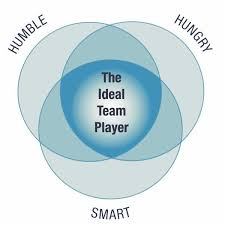
According to Lencioni there are three underlying virtues that make the ideal team player: Humble, Hungry and Smart. Lencioni describes, through an engaging business fable, that when these three qualities combine, team members are more coachable and can more easily overcome the Five Dysfunctions of a Team.
| The Ideal Team Player: |
| Humble: “Great team players lack excessive ego or concerns about status. They are quick to point out the contributions of others and slow to seek attention for their own. They share credit, emphasize team over self, and define success collectively rather than individually. …humility is the single greatest and most indispensible attribute to being a team player.” p.157 |
| Humble: “Great team players lack excessive ego or concerns about status. They are quick to point out the contributions of others and slow to seek attention for their own. They share credit, emphasize team over self, and define success collectively rather than individually. …humility is the single greatest and most indispensible attribute to being a team player.” p.157 |
| Smart: “Of the three virtues , this one needs the most clarification because it is not what it might seem; it is not about intellectual capacity. In the context of a team, smart simply refers to a person’s common sense about people. It has everything to do with the ability to be interpersonally appropriate and aware. Smart people tend to know what is happening in a group situation and how to deal with others in the most effective way. They ask good questions, listen to what others are saying, and stay engaged in conversations intently.” P.160 |
In the book, Lecioni describes the people can fall into various categories depending on their particular strengths and weakness. He defines categories as follows:
| Categories – Strong in 1 of 3 | |
| Humble Only: The Pawn “They are pleasant, kind-hearted, unassuming people who just don’t feel a great need to get things done and don’t have the ability to build effective relationships with colleagues. The often get left out of conversations and activities, and have little impact on the performance of a team. “ P.167 | |
| Hungry Only: The Bulldozer “These people with be determined to get things done, but with a focus on their own interests and no understanding or concern for how their actions impact others. Bulldozers are quick destroyers of teams. ” p.157 | |
| Smart: “They can be entertaining and even likeable for awhile, but have little interest in long-term well-being of the team or their colleagues. Their social skills can sometimes help them survive longer than bulldozers or pawns, but because their contributions to the team are negligible, they often wear out their welcome quickly.” P.160 | |
| Categories – Strong in 2 of 3 | |
| Humble and Hungry, but Not Smart: The Accidental Mess-Maker “They genuinely want to serve the team and are not interested in getting a disproportionate amount of attention and credit. However, their lack of understanding of how their words and actions are received by others will lead them to inadvertently create interpersonal problems o the team.“ P.169 | |
| Humble and Smart, but not Hungry: The Loveable Slacker “They aren’t looking for undeserved attention, and they are adept at working with and caring about colleagues. Unfortunately, they tend to do only as much as they are asked, and rarely seek to take on more work or volunteer for extra assignments. ” p.170 | |
| Hungry and Smart, but Not Humble: The Skillful Politician “these people are cleverly ambitious and willing to work extremely hard, but only in as much as it will benefit them personally. Unfortunately, because they are so smart, skillful politicians are very adept at portraying themselves as being humble, making it hard for leaders to identify them and address their destructive behaviors.” P.160 | |
